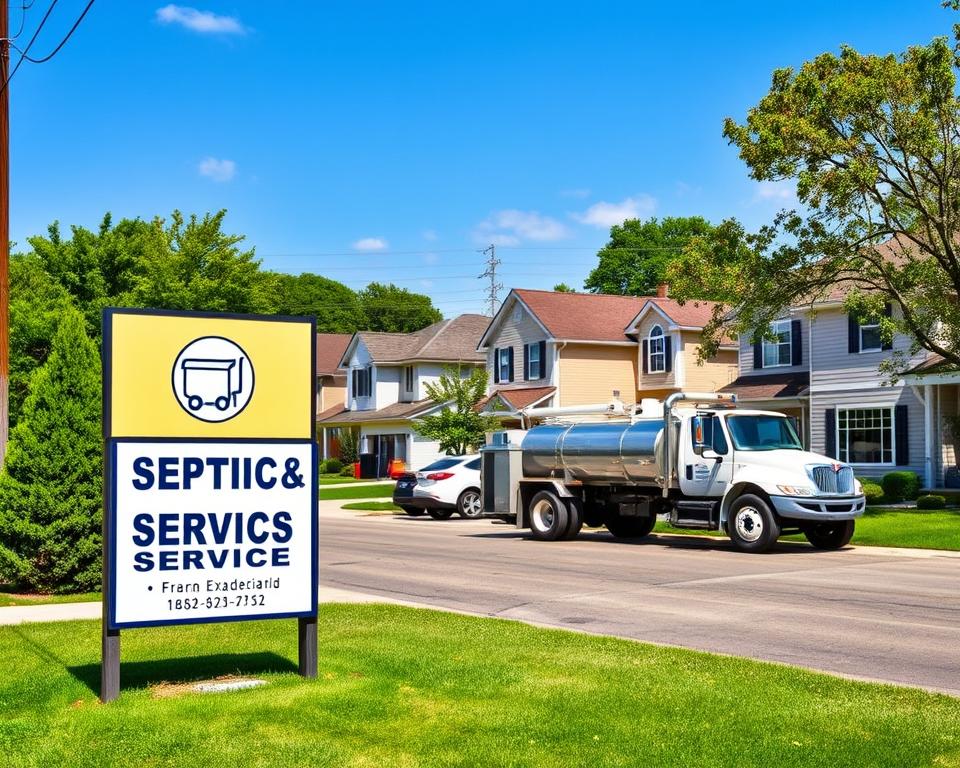Specialist Grease Trap Removal Services Close By
Do you realize the unseen hazards in your restaurant’s oil trap? It’s not just a trivial issue; overlooking appropriate oil trap disposal can severely affect your kitchen and business. In an industry where adhering to municipal guidelines and ensuring hygiene is critical, routine fat interceptor maintenance is vital. By opting for professional fat trap servicing, lipids, oily substances, and oil (FOG) are thoroughly extracted. This not only lengthens the durability of your cooking space pipes but also ensures a tidier setting for your staff.
Committing to these measures boosts your functional efficiency and protects your enterprise from heavy fees. Learn how these specialist services can be a transformative for your business.
Understanding Fat Trap Management Solutions
Fat trap disposal solutions are vital for the effectiveness and security of restaurant kitchens. These solutions target cleaning trap service. They are crucial for capturing lipids, lubricants, and oils (FOG) before they get into the drainage system. Being aware of how these solutions operate helps food establishments adhere to regulations and function properly.
Definition of a Oil Trap?
A grease trap is a wastewater management tool that traps and holds FOG from effluent in commercial kitchens. It stops these detrimental elements from blocking drains and infiltrating sewage systems. This diminishes the possibility of costly pipe blockages and environmental issues. Servicing oil interceptors involves eliminating all the fat to maintain their efficiency.
Importance of Routine Removal
Frequently eliminating fat from interceptors is crucial for seamless running. If fat collects, it can result in:
- Obstructed sewage systems
- Substandard kitchen hygiene
- Potential penalties for non-compliance
Maintaining the FOG level below 25% is vital. This provides the system operates efficiently and preserves the surroundings.
Pros of Professional Services
Specialized fat trap disposal services bring many pros:
- Guarantees adherence with hygiene standards
- Reduces the chance of pipe blockages
- Extends the lifespan of kitchen equipment
With dependable upkeep, food establishments can focus on excellent service. They won’t have to worry about pipe blockages or fines.
| Component | Value | Benefits |
|---|---|---|
| Regular Maintenance | Stops pipe and drain issues | Durable tools |
| Expert Servicing | Adheres to sanitation guidelines | Avoids fines |
| Adherence | Meets municipal guidelines | Improved kitchen reputation |
Food Service Kitchen Waste Removal and Oil Control
Proper waste handling is essential to a commercial kitchen’s efficient functioning. Lipids, oily substances, and oil (FOG) are critical components of food service waste, introducing substantial problems if not disposed of effectively. It’s vital to comprehend the influence of FOG and adopt effective methods for fat handling to ensure an efficient kitchen environment.
The Role of Fats, Lubricants, and Oil (FOG) Influence Your Cooking Area
FOG presents numerous challenges in culinary spaces. Improper disposal can lead to obstructed pipes, resulting in overflows that interrupt operations. These challenges cause expensive repairs and interruptions for enterprises. Frequent assessment of waste disposal methods is crucial to avoid such challenges. Neglecting appropriate FOG removal can escalate into major problems over time.
Approaches for Efficient Waste Handling
Implementing effective waste management methods can substantially boost food service productivity. Think about these practices:
-
Clearing Plates: Eliminate food waste from dishes before rinsing to reduce FOG get into the pipes.
-
Using Strainers: Place sifters in drains to capture solid waste, preventing it from mixing with liquids.
-
Oil Catchers: Based on the kitchen layout, fat traps can substantially reduce oil reach the sewer lines.
Solutions like Fat Trap Cleaning Service deliver customized plans for food service kitchen waste disposal and FOG management, improving food service operations. By emphasizing these methods, restaurants can minimize the dangers linked to FOG and ensure a clean kitchen environment.
| Approach | Overview | Pros |
|---|---|---|
| Dish Cleaning | Eliminating leftover food from tableware before rinsing | Limits fat in drains, stopping backups |
| Basin Sifters | Installing filters to trap food debris in drains | Limits debris leading to fat problems |
| Oil Catchers | Employing tools to catch fat before the drainage system | Meets regional guidelines and cuts upkeep fees |
Opting for the Most Suitable Fat Trap Disposal Services
When choosing oil trap disposal providers, it’s crucial to assess several aspects for the best choice. Evaluating the reputation and expertise of solution providers greatly impacts the standard of service. Firms proficient in local regulations compliance guarantee your business remains compliant.
Elements to Evaluate When Selecting Professionals
Choosing specialists for grease trap management can be complex. Before finalizing, evaluate these aspects:
-
Expertise: Find firms with a proven history.
-
User Testimonials: Opinions from previous customers aid gauge approval ratings.
-
Technology and Equipment: Ensure the service uses up-to-date, efficient gear.
-
Service Speed: Prioritize firms known for prompt and reliable service.
-
Fee Disclosure: Ensure clear pricing to prevent unexpected costs.
Renown and Track Record of Firms
The standing of service providers is essential in your selection process. A reputable business often indicates reliable grease trap disposal services. Consulting digital testimonials and requesting recommendations can help you find dependable firms. Companies with a solid background and favorable client reviews typically demonstrate reliable professionalism.
Municipal Guidelines and Conformance
It’s crucial to know local regulations concerning oil trap removal. These regulations are diverse and violations can lead to serious penalties for your establishment. Verify the company is knowledgeable about these regulations and consistently complies with them. A conforming firm not only shields your operation but also enhances its overall reputation.
| Component | Value | What to Look For |
|---|---|---|
| Experience | Provides reliability and skill | History of operation and sector knowledge |
| Reputation | Reflects level of service | Online reviews and client testimonials |
| Local Compliance | Protects business from legal issues | Understanding of municipal waste guidelines |
| User Assistance | Guarantees effective interaction | Presence and promptness of assistance team |
| Fee Disclosure | Prevents surprise charges | Transparent costs and open charges |
Grease Trap Upkeep Suggestions for Restaurants
Proper kitchen grease trap servicing is essential for food service establishments. By adopting preventative upkeep methods, the durability and functionality of grease traps can be greatly prolonged. This section gives advice into upkeeping oil traps, identifying alerts, and establishing a servicing plan.
Preventative Maintenance Best Practices
To ensure oil traps operate optimally, explore these preventative maintenance best practices:
- Regular cleanings according to fat trap maintenance intervals.
- Appropriate handling of culinary fats and grease.
- Avoiding the introduction of leftover food into drains.
- Routine inspections to review device effectiveness.
Signs Your Grease Trap Needs Attention
Recognizing danger signals can avert costly repairs and service interruptions. Look for:
- Foul odors originating in the cooking area.
- Delayed water flow in basins and appliances.
- Noticeable fat accumulation near pipes or fat traps.
- Repeated clogs or blockages in drainage networks.
Suggested Upkeep Timetable
Setting up a upkeep timetable is crucial for proper food service oil trap maintenance. Typical suggestions include:
| Grease Trap Type | Recommended Service Frequency |
|---|---|
| Compact Interior Devices | Each Month |
| Big Exterior Devices | Quarterly to Biannually |
Sticking to these suggestions will boost the effectiveness and life of fat traps in your kitchen. It also ensures compliance with hygiene standards.
Locating Professional Grease Trap Management Solutions Near You
For commercial kitchen operators, discovering expert fat trap removal providers is essential for maintaining cleanliness and conformance. Start with researching nearby businesses that specialize in grease trap and FOG waste management. Selecting nearby companies provides quick assistance and conformance to municipal guidelines.
Evaluate these aspects:
-
Dependability: Select businesses known for trustworthy support.
-
Eco-Friendly Methods: Examine the green initiatives of prospective firms.
-
Conformance: Ensure they follow local waste disposal regulations.
User testimonials is crucial. Consider testimonials and opinions from other food service businesses. This approach helps locate trusted grease trap management providers in your locality.
| Firm | Assistance Standard | Environmental Responsibility | Adherence to Regional Rules |
|---|---|---|---|
| Oil Trap Management Company | Top | Absolutely | Consistently |
| City Waste Management | Moderate | Yes | Consistent Conformance |
| Sustainable Oil Trap Management | Excellent | Exceptional | Regularly |
By focusing on nearby fat trap cleaning, operations can provide efficient service delivery. This strategy also boosts professional oil handling within their operations.
Final Thoughts
Proper oil trap management solutions are essential for the smooth operation of commercial kitchens. They ensure compliance with local regulations and support a cleaner setting. Routine upkeep and on-time removal prevent blockages and overflows, averting halts and costly repairs.
By using specialized fat trap removal solutions, businesses can focus on their main tasks without concerned over cleanliness. Firms that expertise in food service waste handling provide the required expertise to execute efficient oil management practices. This guarantees that kitchen staff operate in a safe workspace. Companies like “Fat Trap Cleaning Firm” offer timely assistance, enhancing the longevity of plumbing systems and improving food service operations.
Food service establishments that prioritize routine fat trap maintenance and select reliable companies reap substantial advantages. A cleaner culinary workspace not only boosts food safety but also boosts employee morale and customer satisfaction.
Get in Touch for Specialist Fat Trap Disposal Services
If your operation demands dependable grease trap removal measures, prompt support is just a contact away. Our staff at Fat Trap Cleaning Firm is dedicated to delivering expert kitchen waste management suited to your culinary area’s specific needs. We recognize that each establishment is different, and we are dedicated to delivering personalized measures. These measures ensure effective waste handling and conformance to municipal guidelines.
Our knowledgeable and professional team is always prepared to assist you in maintaining a clean culinary space. Regular oil trap servicing boosts your culinary area’s operations and boosts its cleanliness. By opting for our professional culinary waste disposal solutions, you’re committing to the longevity of your tools and the efficient functioning of your business.
Don’t hesitate to get in touch today to set up a consultation. Discover the confidence that comes with dependable oil trap management providers, providing your food service kitchen functions effectively and effectively. Let us handle your fat trap requirements, enabling you to concentrate on effectively catering to your customers.



